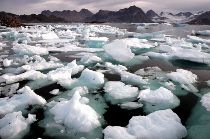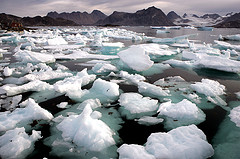UNEP partners with documentary film company for Climate Change Conference
Award-winning documentary film maker, Mark Terry, has made a follow up to his internationally acclaimed film, The Antarctica Challenge: A Global Warning, entitled ‘The Polar Explorer’.

 Award-winning documentary film maker, Mark Terry, has made a follow up to his internationally acclaimed film, The Antarctica Challenge: A Global Warning, entitled 'The Polar Explorer'. A short excerpt will be shown at this year's 16th session Conference of the Parties (COP16) in Cancun Mexico.
Award-winning documentary film maker, Mark Terry, has made a follow up to his internationally acclaimed film, The Antarctica Challenge: A Global Warning, entitled 'The Polar Explorer'. A short excerpt will be shown at this year's 16th session Conference of the Parties (COP16) in Cancun Mexico.
The film is produced by Polar Cap Productions (PCP) in partnership with the United Nations Environmental Programme (UNEP). The film, set in Canada's Northwest Passage, explores the effects of climate change on this Arctic region. The 60 minute HD documentary shows scientists discovering a wide array of marine life and fauna on land and at the bottom of the sea.
The Polar Explorer is being shown throughout the 11 day conference at the Cancunmesse Exhibition Centre, and other venues in Cancun. The Polar Explorer follows explorers searching the depths of the Arctic seas in areas that were previously inaccessible a few years ago. Due to warming temperatures and sea ice melting in the Arctic in recent years, these areas have opened up and an expedition took place this October to discover the untold truths of the region.
Canada's Northwest Passage has long foiled explorers and traders, desperate for a new and quicker trade route. Due to the Arctic Ice Pack, marine shipping has been unable to traverse the passage for most of the year, meaning that the area has never been explored by scientists, until now. Mark Terry, said "I am honoured to participate in this groundbreaking expedition. This research is crucial to our understanding of how climate change is affecting the ecosystems of the north as well as providing an opportunity to explore and study previously inaccessible areas of the Arctic Ocean."
This historic expedition, featuring the work of 10 of the world's foremost polar scientists over a two-week crossing, will be the highlight of a film that will also compare and contrast these findings with the latest studies being conducted in Antarctica and the Arctic. The film will show expeditions made by ArcticNet a Canadian network of scientists, public and private agencies and northern organizations representing 150 researchers from 30 Canadian universities, eight federal and 11 provincial agencies and departments working in collaboration with research teams in Denmark, France, Greenland, Japan, Norway, Poland, Russia, Spain, Sweden, the United Kingdom and the USA. Expeditions and scientific discoveries by The British Antarctic Survey are also shown during the film.
UNEP and PCP are hoping that by showing the Polar Explorer at COP16, delegates and visitors will finally see for themselves the effects of climate change, and the speed at which the ice caps are melting. Achim Steiner, UN Under-Secretary General and UNEP Executive Director, said: "The speed at which the Polar Regions are melting needs to be reflected in the speed with which nations come to agree on a decisive and definitive new global climate agreement. While the science is speaking loudly, it is often difficult for millions if not billions of people to witness this with their own eyes."
A new underwater camera was used to record images never before seen by man. With a titanium housing that can withstand ocean depths of 6,000 meters (20,000 feet) and temperatures as low as -5 Celsius, this revolutionary camera will be key to surveying new depths and areas of the Arctic Ocean, although the depths of the Passage where filming will take place do not exceed 200 meters and temperatures do not go below – 1.8 degrees Celsius. Aerial photography from the ship's on-board helicopter will provide an extra dimension of stunning HD cinematography. The full version of The Polar Explorer is scheduled for release in spring 2011.
Author: Charity Knight | Climate Action
Image: Nick Russill | flickr






